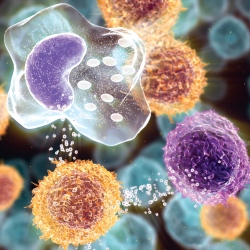
Humans and chimps may share most of their genes, but humans are far more susceptible to diseases like cancer. Factors that influence the way the genes are read could explain why.
If an extra methyl group adorns a gene – an epigenetic change called DNA methylation – the gene can be less likely to be expressed.
A research team including Genevieve Konopka at the University of Texas Southwestern Medical Center in Dallas analysed samples from the prefrontal cortices of humans and chimps for levels of methylation. Their analysis showed that the human cortex tends to be much less methylated than those of chimps.
Looking closer, they realised that the genes that were differently methylated included ones that have previously been linked to cognitive impairment and some cancers.
The study provides evidence that differences in methylation could be an important clue to human brain evolution, says Konopka.
